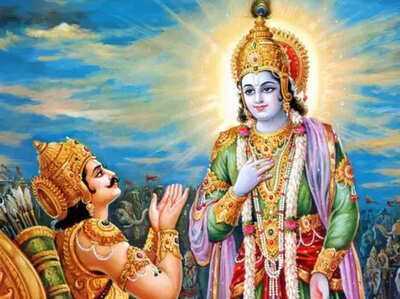
You’ve probably wondered about it at some point—whether it was in the middle of a personal crisis, after losing someone you loved, or maybe just while zoning out during a long Uber ride: Is my life the result of my past actions? Will my next one depend on this one? It’s an unsettling thought, isn’t it? The idea that life isn’t random, that the joys and struggles you face didn’t just appear out of nowhere, but are threads woven by your own choices—some from this life, others from ones you don’t even remember. It makes you pause before blaming fate. The Bhagavad Gita, that ancient dialogue between Krishna and Arjuna, doesn’t just give us a yes or no answer. It hands us something far more valuable: a way of seeing life itself.
1. Karma: More Than Just a Cosmic Scoreboard Most people think of karma as a simple equation—do good, get good; do bad, suffer. But Krishna teaches that it’s not that mechanical. It’s not about punishment or reward. It’s about cause and effect. Your actions create momentum, shaping the trajectory of your existence. But here’s the part most people overlook—karma isn’t just about what you do, but how you do it.
Intent matters. If you give to charity but only for praise, that action carries a different weight than if you give with sincerity. If you hurt someone, not out of cruelty but ignorance, the consequences are different. Karma isn’t just about action; it’s about awareness.
2. Your Next Life: A Mirror, Not a Sentence The Gita explains that after death, the soul doesn’t just float aimlessly. It carries the weight of its experiences, tendencies, and unresolved desires. What you long for, what you cling to, what you fail to learn—it all carries forward.
But here’s the thing: your next birth isn’t a punishment for this one. It’s simply the next chapter of your learning. If you’ve spent this life consumed by greed, maybe your next life will give you the experience of lack—to understand what you failed to grasp. If you’ve nurtured kindness, maybe your next life places you where that kindness can heal many. It’s not a courtroom. It’s a classroom.
3. The Way Out: The Karma You Don’t Have to Carry Krishna offers an escape route from this endless cycle of rebirth: detachment. Not from life itself, but from obsession over outcomes. Do your duty, but don’t be chained to the results. Love without expecting, work without demanding, give without needing something in return.
Why? Because the more you cling, the more you return. The moment you act without ego, without attachment, without fear—you stop accumulating the karma that binds you to another birth. You become free.
So, What Does This Mean for You—Right Now? It means your life is neither a meaningless accident nor a cruel joke played by the universe. It means your choices matter, not because of some divine punishment, but because they shape who you are becoming. It means that whatever you are facing now is not an unfair burden—it’s a path you set in motion, and more importantly, a path you can change.
It means that instead of worrying about what your next life will be, maybe it’s time to live this one with the kind of wisdom that ensures you won’t need another. Because the highest truth Krishna gives us is not that karma decides your next birth. It’s that you do.
 You’ve probably wondered about it at some point—whether it was in the middle of a personal crisis, after losing someone you loved, or maybe just while zoning out during a long Uber ride: Is my life the result of my past actions? Will my next one depend on this one? It’s an unsettling thought, isn’t it? The idea that life isn’t random, that the joys and struggles you face didn’t just appear out of nowhere, but are threads woven by your own choices—some from this life, others from ones you don’t even remember. It makes you pause before blaming fate. The Bhagavad Gita, that ancient dialogue between Krishna and Arjuna, doesn’t just give us a yes or no answer. It hands us something far more valuable: a way of seeing life itself.
You’ve probably wondered about it at some point—whether it was in the middle of a personal crisis, after losing someone you loved, or maybe just while zoning out during a long Uber ride: Is my life the result of my past actions? Will my next one depend on this one? It’s an unsettling thought, isn’t it? The idea that life isn’t random, that the joys and struggles you face didn’t just appear out of nowhere, but are threads woven by your own choices—some from this life, others from ones you don’t even remember. It makes you pause before blaming fate. The Bhagavad Gita, that ancient dialogue between Krishna and Arjuna, doesn’t just give us a yes or no answer. It hands us something far more valuable: a way of seeing life itself.